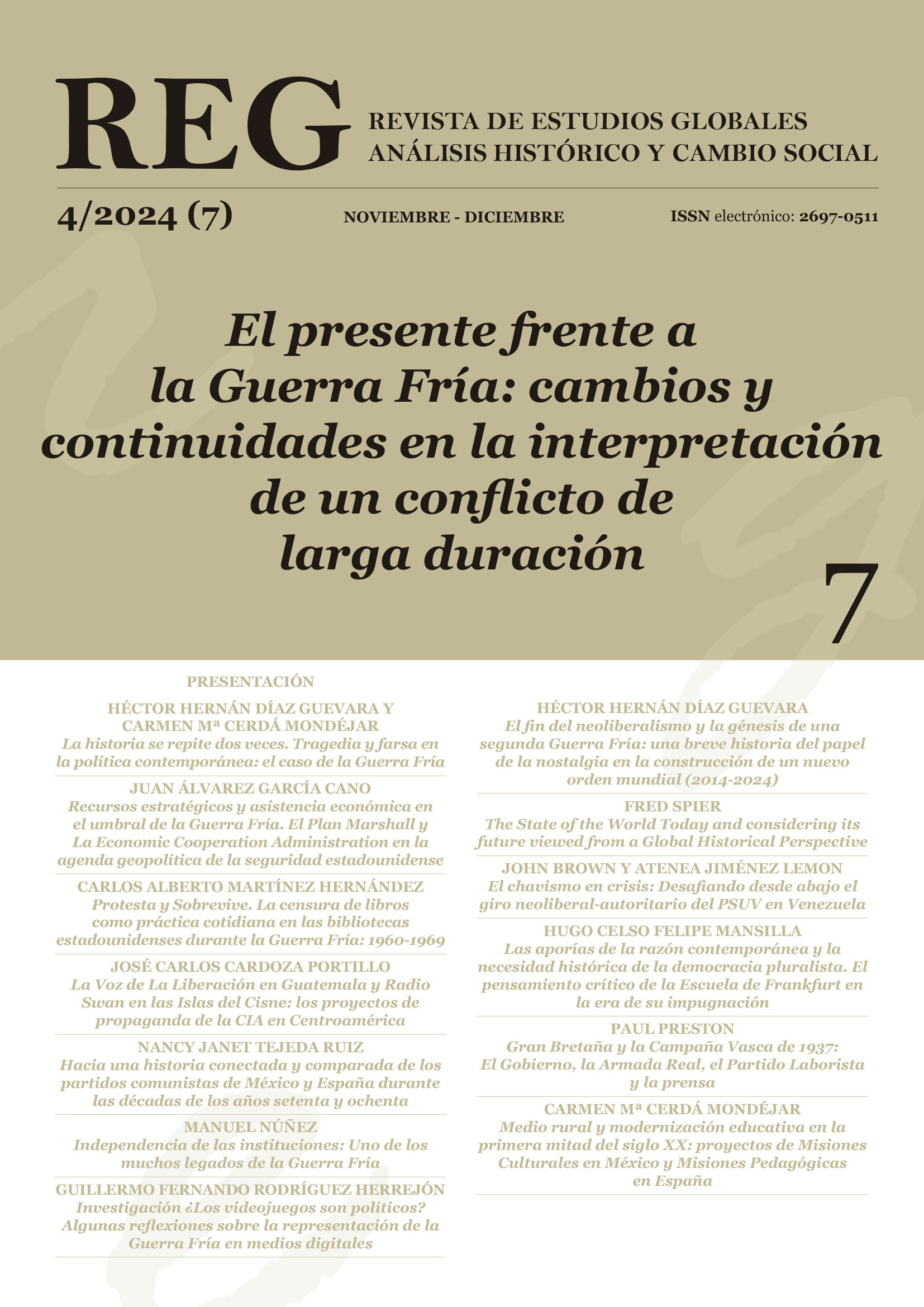The End of Neoliberalism and the Genesis of a Second Cold War: a Brief History of the Role of Nostalgia in the Construction of a New World Order (2014-2024)
Abstract
The recovery of the concept of the Cold War with a view to ordering a new world order that responds to the capabilities and scope of the American grand strategy is challenged by the actions of the other two actors with the capacity for extraregional mobilization: China and Russia. In this work we carry out an exercise in history applied to international relations where we propose to present the development of the concept of the Cold War from its nostalgic recollections of a world that—in theory—was more predictable as was the post-war world towards the construction of a new system where Washington, Moscow and Beijing test their strategies in the face of an eventual multipolar system formed between the Crimean crisis of 2014 and the anti-liberal election of Donald Trump in 2024.
Downloads
Metrics
-
Abstract550
-
pdf (Español (España))140
References
Aparicio Ramírez, Mariana. 2019. «Reflexiones en torno a la política comercial de
Donald Trump: multilateralismo, acuerdos de libre comercio y guerras comerciales».
Norteamérica 14 (2): 121–45. https://doi.org/10.22201/cisan.24487228e.2019.2.382.
Belmonte, Laura A.. 2008. Selling the American way : U.S. propaganda and the Cold War.
Philadelphia: University of Pennsylvania Press.
Brands, Hal, y John Lewis Gaddis. 2021. «The New Cold War: America, China, and
the Echoes of History». Foreign Affairs 100 (10): 10–20.
Cammaerts, Bart. 2022. «The abnormalisation of social justice: The ‘anti-woke culture
war’ discourse in the UK». Discourse and Society 33 (6): 730–43. https://doi.
org/10.1177/09579265221095407.
Carlson, Tucker. 2024. «Interview to Tucker Carlson». Russia: President of Russia.
http://en.kremlin.ru/events/president/news/73411.
Diamond, Larry. 2024. «How to End the Democratic Recession: The Fight against
Autocracy Needs a New Playbook». Foreign Affairs 103:126. https://www.foreignaffairs.
com/world/how-end-democratic-recession-autocracy-larry-diamond.
Díaz Guevara, Héctor Hernán. 2022. «‘Los cóndores que cazaban tigres de papel’.
Una historia comparativa del maoísmo durante la Guerra Fría en Colombia y Perú
(1964-1993)». Morelia: Universidad Michoacana de San Nicolás de Hidalgo.
———. 2023a. «La apuesta por el multilateralismo y Latinoamérica: la gran estrategia
china y la formación de un mundo multipolar». En ¿El siglo chino? Política, geopolítica
y transformación nacional, 141–53. San José de Costa Rica: Sistema de Integración Centroamericana.
———. 2023b. «Más allá de la Guerra Fría: cambios y continuidades en la disputa
ideológica y tecnológica por el tercer mundo entre Estados Unidos y China». Revista
Mexicana de Ciencias Políticas y Sociales 63 (248): 141–70. https://doi.org/10.22201/
fcpys.2448492xe.2023.248.78078.
EFE. 2021. «Nostalgia soviética: más del 60% de los rusos lamenta la caída de la
URSS». El Confidencial, el 22 de diciembre de 2021. https://www.elconfidencial.
com/mundo/europa/2021-12-22/urss-nostalgia-sovietica-rusia-caida-60-por-ciento-
rusos_3346180/.
Fazio Vengoa, Hugo Antonio. 2010. La Historia del Tiempo Presente: historiografía, problemas
y métodos. Bogotá: Universidad de los Andes.
Ferguson, Nial. 2025. «How to Win the New Cold War: To Compete With China,
Trump Should Learn From Reagan». Foreign Affairs 104 (1).
Ferguson, Niall. 2019. «The New Cold War? It’s With China, and It Has Already
Begun». New York Times, el 2 de diciembre de 2019. https://www.nytimes.
com/2019/12/02/opinion/china-cold-war.html.
Flint, Colin. 2006. Introduction to geopolitics. Introduction to Geopolitics. New York:Routledge. https://doi.org/10.4324/9781003138549-1.
Gaida, Jamie, Jennifer Wong-Leung, Stephan Robin, y Danielle Cave. 2022. «The
global race for future power Who is leading the critical technology race? Compare
Quad countries 4 against China in Quantum computing». www.aspi.org.au.
Hanhimäki, Jussi M. 2014. «The (really) good war? Cold War nostalgia and American
foreign policy». Cold War History. Routledge. https://doi.org/10.1080/14682745.20
950245.
Hillman, Jennifer. 2023. «China’s Entry into the WTO. A Mistake by the United States?»
En China and the WTO, editado por Henry Gao, Damian Raess, y Ka Zeng, 400–426. New
York: Cambridge University Press. https://doi.org/10.1017/9781009291804.023.
Judt, Tony. 2018. Postguerra. Una historia de Europa desde 1945. Taurus. Vol. 1. Santillana.
Kendall-Taylor, Andrea, y Michael Kofman. 2025. «Putin’s Point of No Return».
Foreign Affairs 104 (1). https://www.foreignaffairs.com/russia/putins-point-no-return?
check.
Khinkulova, Kateryna. 2012. «Hello, Lenin? Nostalgia on Post-Soviet Television in
Russia and Ukraine». VIEW Journal of European Television History and Culture 1 (2):
–104. http://www.telekritika.ua/telebachennya/2007-11-06/34742.
Krickovic, Andrej. 2014. «Imperial nostalgia or prudent geopolitics? Russia’s efforts
to reintegrate the post-Soviet space in geopolitical perspective». Post-Soviet Affairs 30
(6): 503–28. https://doi.org/10.1080/1060586X.2014.900975.
LeDonne, John P. 2004. The Grand Strategy of the Russian Empire, 1650-1831. New York:
Oxford University Press. www.oup.com.
Legvold, Robert. 2014. «Managing the New Cold War: What Moscow and Washington
Can Learn From the Last One». Foreign Affairs 93 (4): 74–84.
Lewis Gaddis, John. 2019. Grandes Estrategias. Taurus.
Lukin, Alexander. 2003. The Bear Watches the Dragon. Russia’s Perceptions of China and
the Evolution of Russian-Chinese relations Since the Eighteenth Century. Routdlege.
Manor, Ilan, y James Pamment. 2022. «From Gagarin to Sputnik: the role of nostalgia
in Russian public diplomacy». Place Branding and Public Diplomacy 18 (1): 44–48.
https://doi.org/10.1057/s41254-021-00233-3.
Marangé, Céline. 2019. «Rusia». En Comparative Grand Strategy. A Framework and Cases,
–72. New York: Oxford University Press.
Markova, María. 2020. «The Political Use of Soviet Nostalgia to Develop a Russian National
Identity». EInternational Relations, julio. https://www.e-ir.info/2020/07/14/
the-political-use-of-soviet-nostalgia-to-develop-a-russian-national-identity/.
Mearsheimer, John J. 1990. «Back to the Future: Instability in Europe after the
Cold War». International Security. Vol. 15. http://links.jstor.org/sici?sici=0162-
%28199022%2915%3A1%3C5%3ABTTFII%3E2.0.CO%3B2-Y.
Müllerson, Rein. 2017. Dawn of a New Order. Geopolitics and the Clash of Ideologies. London:
I.B. Tauris. www.ibtauris.com.
Olstein, Diego. 2021. A brief history of now: The past and present of global power. A Brief
History of Now: The Past and Present of Global Power. Palgrave Macmillan. https://doi.
org/10.1007/978-3-030-82420-4.
Pacheco Méndez, Guadalupe. 2024. «La estrategia de seguridad nacional de Rusia y
el conflicto con la OTAN y Ucrania». Política y Cultura, núm. 61 (junio), 9–38. https://
doi.org/10.24275/AOTH1275.
Paine, S. C. M. 1996. Imperial Rivals. China, Russia, and Their Disputed Frontier. New
York: M. E. Sharpe, Inc.
Putin, Vladimir. 2001. «Speech in the Bundestag of the Federal Republic of Germany
». En President of Russia, 1–10. Berlin: President of Russia.
Roberts, Kevin D.. 2023. «A Promise to America». En Mandate for Leadership: The Conservative
Promise 2025, 1–17. Washington D.C.: The Heritage Foundation.
Sanz Díaz, Carlos, y José Manuel Sáenz-Rotko. 2022. «¿Segunda Guerra Fría? Un
análisis desde la Historia y las Relaciones Internacionales». Relaciones Internacionales,
núm. 51 (octubre), 167–84. https://doi.org/10.15366/relacionesinternacionales2022.51.009.
Schindler, Seth, Ilias Alami, Jessica DiCarlo, Nicholas Jepson, Steve Rolf, Mustafa
Kemal Bayırbağ, Louis Cyuzuzo, et al. 2024. «The Second Cold War: US-China Competition
for Centrality in Infrastructure, Digital, Production, and Finance Networks».
Geopolitics 29 (4): 1083–1120. https://doi.org/10.1080/14650045.2023.2253432.
Todd, Emmanuel. 2012. Después del imperio. México: Akal.
Traverso, Enzo. 2024. Gaza ante la historia. Madrid: Akal.
Trenin, Dimitri. 2014. «The Crisis in Crimea Could Lead the World into a Second
Cold War». The Guardian, el 2 de marzo de 2014. https://www.theguardian.com/
commentisfree/2014/mar/02/crimea-crisis-russia-ukraine-cold-war.
Xi Jinping. 2022. «Informe presentado ante el XX Congreso Nacional del PCCh». En
Agencia de Noticias Xinhua, 1–62. Beijing: Agencia de Noticias Xinhua.
Yee, Herbert S. 1983. «The Three World Theory and Post-Mao China’s Global Strategy
». International Affairs 59 (2): 239–49.
Yi Chu. 1989. «Sino-Soviet Relations: Review and Prospect». Beijing Review, el 22 de
mayo de 1989.
Copyright (c) 2025 Revista de Estudios Globales. Análisis Histórico y Cambio Social

This work is licensed under a Creative Commons Attribution-NonCommercial-NoDerivatives 4.0 International License.










